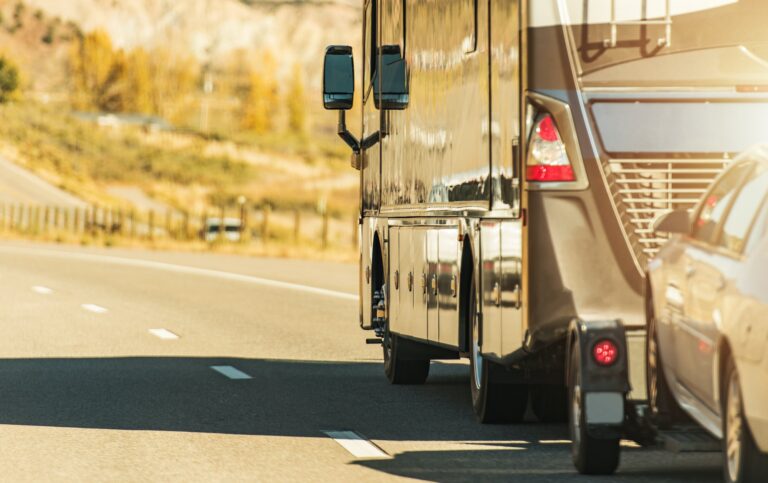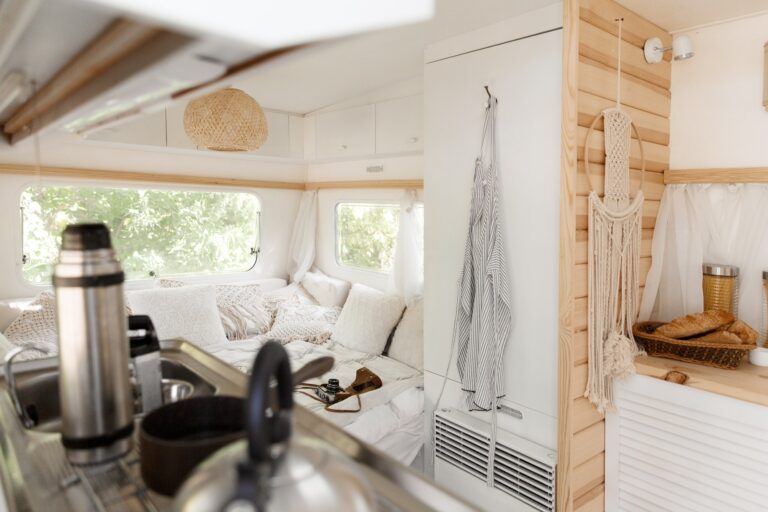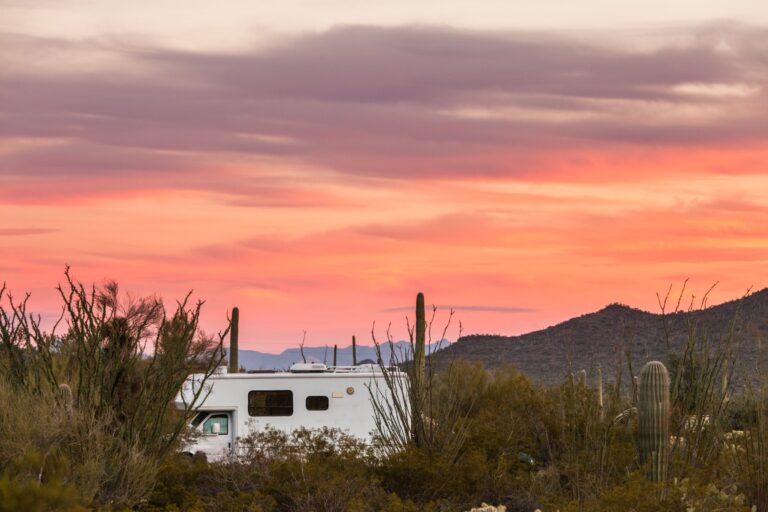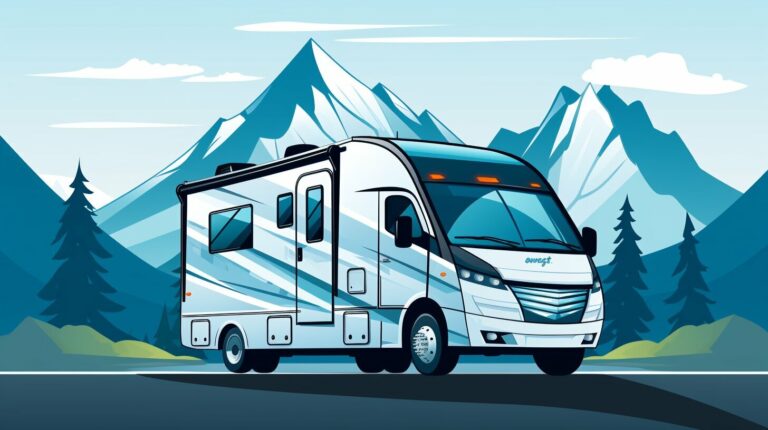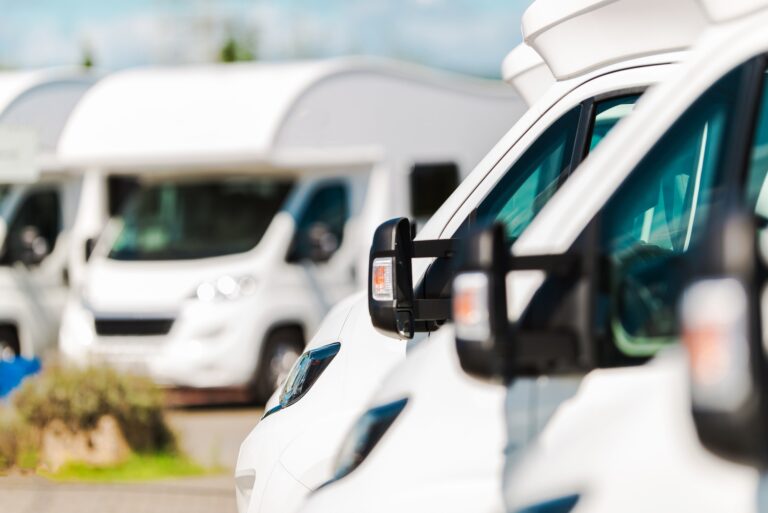Recreational vehicles (RVs) are like moving homes, modern and comfortable. They keep your lights on, appliances working, and phones charged. But, where do they get this power? This guide will show you the various sources that power RVs. You’ll learn how to manage your power so camping is smooth and enjoyable.
Key Takeaways
- RVs can draw power from a variety of sources, including generators, solar panels, batteries, and shore power connections.
- Understanding the different RV power sources and how they work is crucial for efficient power management.
- Proper wiring and electrical safety are essential for maintaining the integrity of your RV’s power system.
- Effective power management strategies can help you conserve energy and extend the runtime of your RV’s electrical components.
- Choosing the right RV power sources and understanding your power needs can ensure you have the energy you need for your adventures.
Understanding RV Power Sources
Choosing how to power your RV involves considering several options. Among the most common are generators and solar panels. It’s important to know the advantages and disadvantages of each. This knowledge will help you pick the best power solution for your RV lifestyle.
RV Generators
RV generators ensure your vehicle has electrical power whenever needed. They run on gasoline, diesel, or propane, fitting different RV types. These generators are great for powering big devices. This includes air conditioners, microwaves, and power tools. They shine during long off-grid stays.
One big plus of generators is their reliability. You can start them anytime to get power. This is unlike solar panels, which need the sun. However, generators need upkeep, use fuel, and can make noise, which might bother some RVers.
RV Solar Panels
More and more RV owners are turning to solar panels. These panels use sunlight to charge your RV’s batteries. They’re a clean, eco-friendly, and quiet way to keep your RV powered. Solar panels are perfect for extended trips or places without shore power.
Solar panels don’t need fuel or make noise, unlike generators. They’re low maintenance and offer ongoing power with sunshine. But, they can be costly initially and might not power everything like generators do.
Think about your RV power needs, how you like to camp, and what you can afford when picking between RV generators and RV solar panels. For many RVers, a mix of both is best. It gives you generator reliability and solar sustainability.
“The most important factor in choosing an RV power source is understanding your energy needs and how you plan to use your RV.” – RV expert, Jane Smith
RV Electrical Systems Explained
Your RV’s electrical system is key to its power. It’s vital to know how it works for a dependable ride and a stress-free journey. We’ll dive into the essential parts of your rv electrical systems, rv wiring, and rv power distribution.
Wiring and Circuits
The center of your RV’s electric network is its wiring. This rv wiring spreads power from the batteries to lights, appliances, and more. It’s divided into different circuits, each with a circuit breaker to stop overloads and shorts.
Power Distribution Panels
The core of rv power distribution is the power distribution panel. It’s the control center for the electricity in your RV. It contains circuit breakers, fuses, and other important controls. Knowing how to use this panel is crucial for keeping your RV’s power running smoothly.
Inverters and Converters
RVs use both 12-volt DC and 120-volt AC power. Inverters and converters help switch between these powers. Inverters change 12-volt DC from your batteries to 120-volt AC for appliances. Converters do the opposite, making 12-volt DC to power other items.
| Component | Function |
|---|---|
| Wiring and Circuits | Distributes power throughout the RV |
| Power Distribution Panel | Manages and regulates the flow of electricity |
| Inverters and Converters | Transforms between 12-volt DC and 120-volt AC power |
Knowing how all these parts work together is key. Learn the basics to keep your RV’s power in check. This knowledge is handy for any power situation, from off-grid camping to site hook-ups.
The Role of RV Batteries
RV batteries keep your vehicle running. They power your appliances, lights, and gadgets. Knowing about different types and how to care for them is key. It ensures your RV’s electrical systems work well.
Battery Types for RVs
There are two main types: lead-acid and lithium-ion. Rv battery types vary in cost and performance. Lead-acid is the classic choice, cheaper but heavier. Lithium-ion is pricier but lasts longer and is more efficient.
- Lead-acid batteries are cost-effective and heavy. They need regular attention like checking water levels and cleaning.
- Lithium-ion batteries are a lighter and more efficient option. They require less care and last longer, but they are more expensive.
Battery Maintenance and Charging
Enabling your rv batteries to last takes good care. Here are some maintenance tips:
- Check water levels often, topping up when necessary.
- Ensure the battery terminals are always clean and free of corrosion.
- Prevent full discharges, as it can harm the batteries’ longevity.
- Charge regularly, using shore power or solar panels.
Understanding rv battery types and caring for them properly is essential. It keeps your RV powered reliably while you travel.
| Battery Type | Lifespan | Maintenance | Cost |
|---|---|---|---|
| Lead-Acid | 3-5 years | Moderate | $100-$300 |
| Lithium-Ion | 5-10 years | Low | $500-$1,000 |
RV Power Inverters: Converting DC to AC
When you’re traveling in your RV, you need power for your electronics and more. RV power inverters help by changing the 12-volt direct current (DC) into the 120-volt alternating current (AC) your gadgets use. This change is vital for running household items in your RV.
RV power inverters let you use a variety of devices, including TVs and air conditioners. Without them, you could only power things with 12-volt DC. This would limit what you can do and affect your comfort while traveling.
How RV Power Inverters Work
RV power inverters shift power from your RV’s batteries or alternator. They turn 12-volt DC into 120-volt AC through inversion. This process lets AC devices work on RV power.
The right inverter for your RV depends on its electric needs. Smaller ones handle fewer devices, while big ones can power microwaves or air conditioners.
Choosing the Right RV Power Inverter
- Decide the inverter size based on what your RV’s electronics and appliances need.
- Look for inverters with pure sine wave output to power up delicate electronics safely.
- Make sure the inverter matches your RV’s electricity setup and handles all your item’s power needs.
- Choose a quality inverter for dependable operation and a longer life.
Know how RV power inverters operate and picking the right one means you can use all your familiar gadgets and items on the go. This ensures you get the power and performance wherever your travels take you.
| Feature | Benefit |
|---|---|
| Converts 12V DC to 120V AC | Allows you to power a wide range of AC appliances and electronics in your RV |
| Pure Sine Wave Output | Provides clean, stable power for sensitive electronic devices |
| High Efficiency | Minimizes power loss and conserves your RV’s battery power |
| Automatic Shutoff | Protects your devices and the inverter from overload or low battery conditions |
“RV power inverters are the unsung heroes of the open road, enabling us to enjoy the comforts of home while exploring the great outdoors.”
How Do RVs Get Power from Shore Power?
When you park your RV at a campsite, you can plug it in to a shore power source. This source gives 120-volt AC power. It means you can run your RV’s electrical items and charge batteries without your own generator. Or solar panels.
RV Shore Power Hookups
Plugging into shore power is easy. Your RV has a special socket on its outside just for this. You then use an RV electrical cord to connect it. This cord is made for RVs and handles the power they need.
At campsites, there’s a power pedestal with outlets for 30 or 50 amps. You match the amp number with your RV socket. This ensures a good, safe link to shore power.
Power Pedestal and RV Electrical Cords
The power pedestal is crucial, giving your RV access to shore power. It’s built tough for outdoor use. Always use an rv electrical cord meant for RVs. They are longer and able to handle RV power needs.
Picking the right rv power hookups is vital for your RV’s electrical safety. Learn how to do shore power connections and choose the right cords. This lets you enjoy worry-free power on your RV trips.
RV Power Management Systems
Keeping your RV’s electrical system running smoothly is a big deal. Knowing and using smart rv power management tips makes this easier. This way, your RV will run well and you won’t have to worry about power levels on your trips.
Conserving Power in Your RV
To keep power usage low in your RV, watch how much you use and keep your batteries in good shape. Find out which things in your RV, like air conditioners, use the most power. Try to use them less when you’re relying on your battery.
- Use LED lights to save power.
- Always unplug things you’re not using to stop them wasting power.
- Keep your RV’s batteries well-maintained.
- Think about upgrading to a better RV power inverter.
| Power Conservation Tip | Estimated Power Savings |
|---|---|
| Switch to LED lighting | 30-50% reduction in lighting power |
| Unplug unused devices | Up to 10% reduction in total power usage |
| Upgrade to a high-efficiency RV inverter | 15-25% improvement in power efficiency |
Use these rv power management tips to save on power. This will help your RV’s battery last longer. It also means you can enjoy your trips without worrying about power as much.
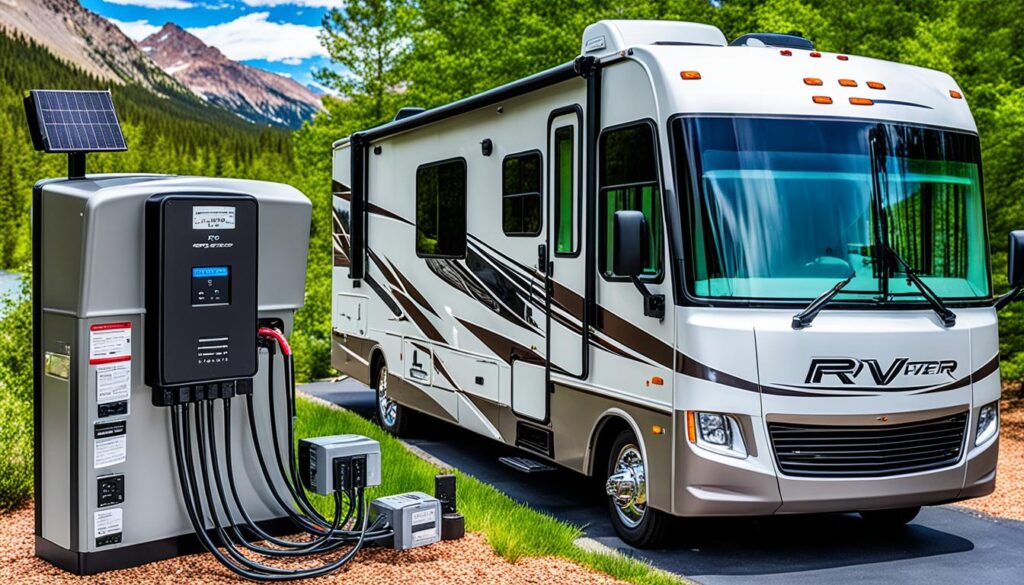
“Proper rv power management lets you enjoy your RV more without power concerns. Saving power means more fun exploring and less worrying about running out.”
Choosing the Right RV Power Sources for Your Needs
When you pick how to power your RV, there’s no one answer. It’s key to choose the best power combo for how you use your RV. This might mean going with a generator, solar power, or a bit of both. Knowing what you need is the first step to wise RV power choices.
Evaluating Your RV Power Requirements
First, figure out how much power you use in your RV. Think about all the gadgets and devices you have. Lights, AC, fridge, and your entertainment gear all add up. Add together their power needs to guess how much you use daily.
Also, think about where you’ll use power in your RV. Will you stay in places with power outlets or go off-the-grid more often? Deciding this helps figure out how much generator or solar power you’ll need.
Selecting the Appropriate RV Power Sources
- Generators: These are dependable and give constant power for your RV’s stuff. Pick one that can match your RV’s highest power needs and fits how you camp.
- Solar Panels: More and more RVers are going for solar for green, reliable power. They work well when you’re camping off-the-grid. Look for panels that meet your power needs.
- Hybrid Solutions: Using both generators and solar can be a good idea. It means your RV can handle lots of power when you need it and stay charged every day.
The best RV power choice is all about what you need, how you camp, and your budget. Carefully look at your needs and the options available. This way, you can make sure your RV has the right power for your road trips.
| Power Source | Advantages | Disadvantages |
|---|---|---|
| RV Generator |
|
|
| RV Solar Panels |
|
|
| Hybrid Solution |
|
|
“The right RV power source selection is crucial for a comfortable and self-sufficient RVing experience. It’s all about finding the perfect balance between your power needs and the available solutions.”
The Importance of Proper RV Wiring and Electrical Safety
Keeping your RV’s electrical system safe and reliable is very important. Ensuring proper rv electrical wiring and following safety rules is key. This helps avoid dangers like rv electrical fire prevention. We will look at how to keep your RV’s electrical setup safe and working well.
One key part of rv electrical safety is using circuit breakers correctly. Circuit breakers protect your RV’s electrical system from too much current or short circuits. Make sure they are the right size for your wiring. Also, check them often for damage.
Choosing the right wire size is also crucial in rv electrical wiring. The right wire size stops overheating, voltage drops, and fires. Always go by what your RV’s maker suggests. Or ask a certified electrician for advice based on your RV’s model and power needs.
Having good grounding is vital in rv electrical safety. All electrical parts in your RV must be grounded well. This lowers the chance of electric shocks and dangers. Regularly check the ground system for any problems.
“Proper rv electrical wiring and adherence to electrical safety protocols are essential to prevent potential hazards, such as rv electrical fire prevention.”
By following these tips, you make your RV’s electrical system safer. Enjoy your RV more, knowing it’s safer for you and your family. Remember to check and keep your RV’s electrical wiring and safety in good shape. This can really help in the long term.
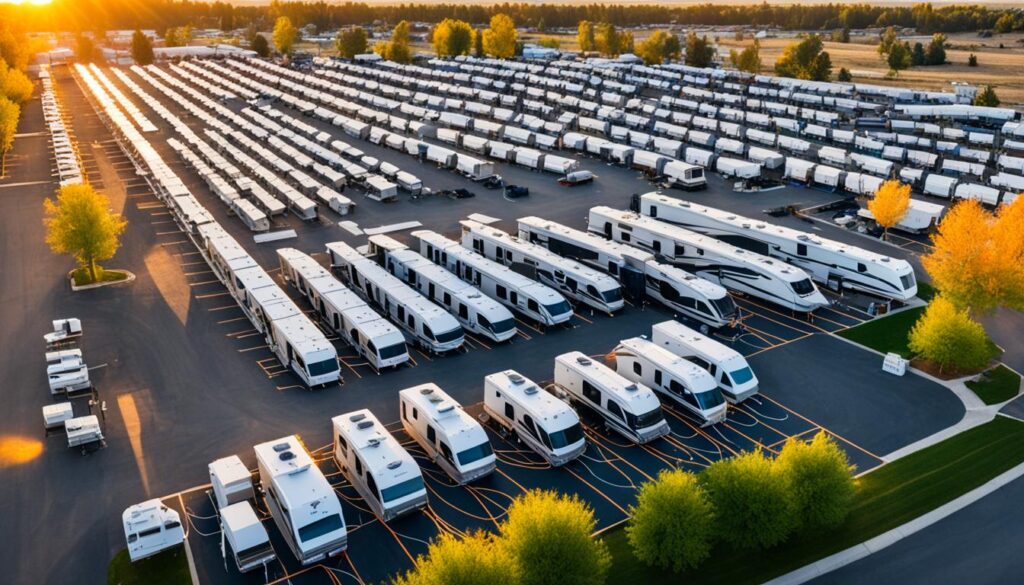
Conclusion
You’ve learned about the many ways RVs can get power, like through generators and solar panels. Also, batteries play a big role, as do shore power connections. With this knowledge, you can make your RV more power-efficient. This will lead to a better camping experience.
Understanding RV batteries and power inverters is key. So is knowing how to manage power effectively. These skills help ensure your RV has the right amount of energy. Thus, your journey will be filled with confidence and peace of mind.
This guide is for both new and experienced RV fans. It covers everything you need to know about RV power and electrical systems. Now, with this information, you can power your RV. Then, head out on many amazing adventures and make unforgettable memories.

